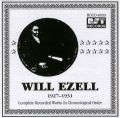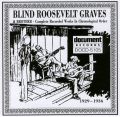"Search Document Records - Blind Roosevelt Graves Results "
Viewing 1 to 2 of 2
Will Ezell 1927 - 1931 With the exception of some sessions accompanying other singers, the complete Will Ezell is on this single CD. A talented blues and boogie-woogie pianist, Ezell led four mostly instrumental solo sessions (resulting in 12 performances). In addition, his dates backing singers Marie Bradley, Ora Brown, Bertha Henderson, and Slim Tarpley are also included on this enjoyable and historic CD. Among the more rewarding selections are Barrel House Man, Mixed Up Rag, Heifer Dust, Playing the Dozen, and Pitchin’ Boogie. – Scott Yanow
More Info on our New Store >> |
||
Blind Roosevelt Graves 1929 - 1936 Blind Roosevelt Graves, vocal, guitar. Genres: Country Blues, Country gospel, Country blues guitar/ Informative booklet notes by Ken Romanowski. From this album's booklet notes:
Ishman Bracey and informant Chester House asserted that Graves was from South Central Mississippi and played on the streets and in the local juke joints in various towns throughout that area. House, who had performed with Graves in the 1920s, specifically named Rose Hill as the home of the blind guitarist. Graves moved to Gulfport, Mississippi after World War II where he reputedly died in the 1960s. Blues historian Paul Oliver speculates that Roosevelt may have been born in the I890s as Uaroy appears to have been born around 1900. The elder Graves, who was totally blind, usually played a twelve-string guitar and took most of the lead vocals, while his younger brother, who was blind in one eye, harmonized and played tambourine.
The music they recorded offers us an opportunity to glimpse the rough sound of a small black country band as it would have performed in the juke joints of Mississippi in the period between the World Wars. Graves and his brother were seemingly comfortable with a number of styles (a flexibility natural enough for street musicians), particularly the religious numbers which resonate with an authentic fervor and musical vitality. In all probability they were songsters with a strong religious bent who were requested at their Paramount session to perform popular blues and boogie items. Continued... More Info on our New Store >> |
||


